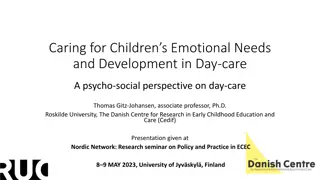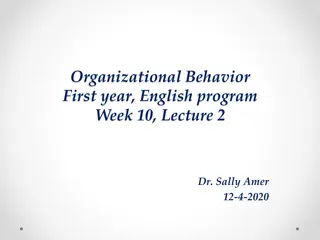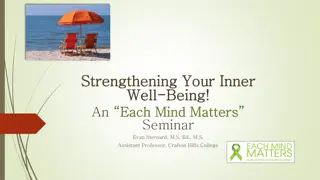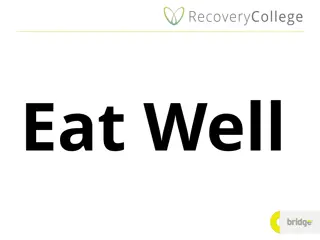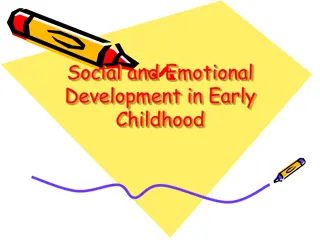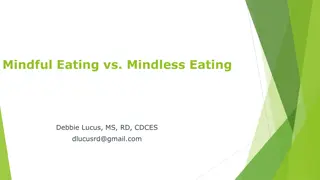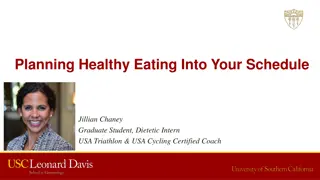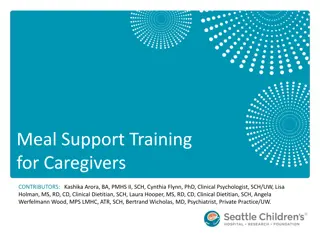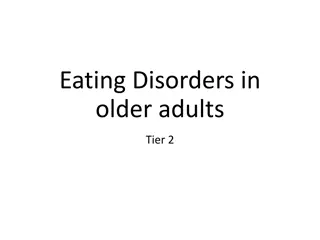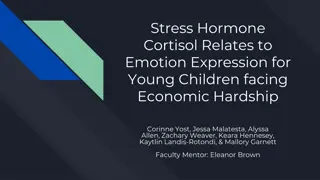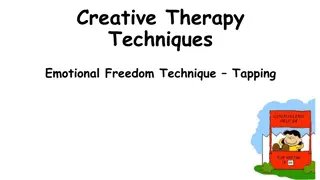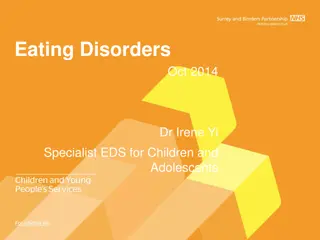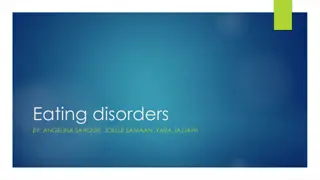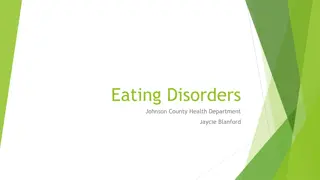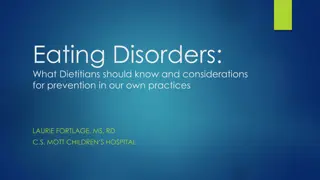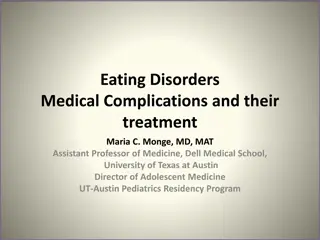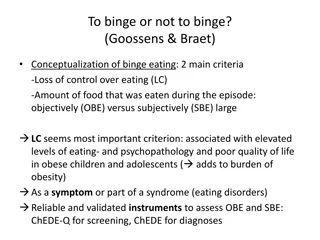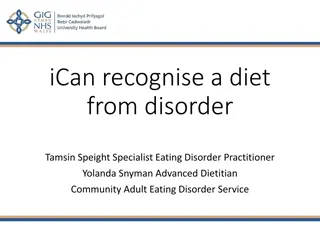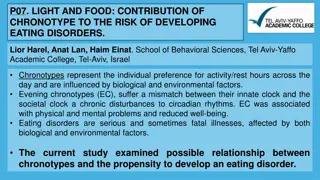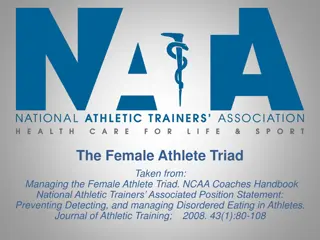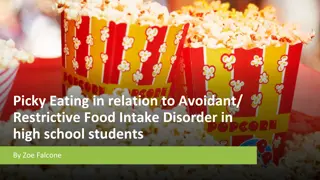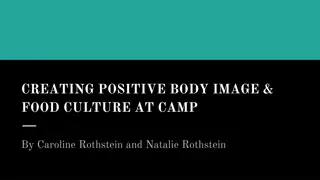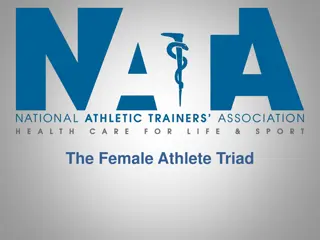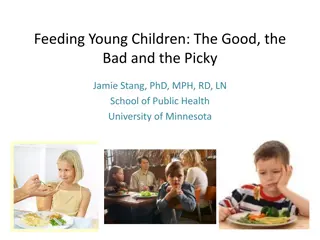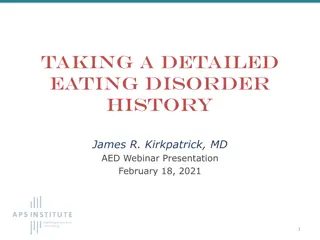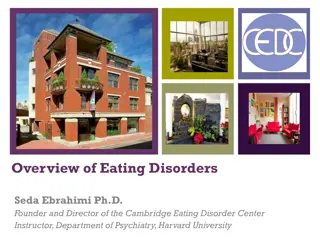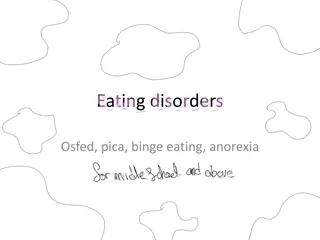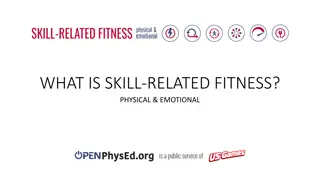EXERCISE ADDICTION AND DISORDERED EATING IN ADOLESCENTS
A study led by Dr. Mia Beck Lichtenstein introduces the Exercise Addiction Inventory for Youth (EAI-Y) to assess exercise addiction in adolescents, particularly those with disordered eating. The research aimed to validate the EAI-Y, estimate the prevalence of exercise addiction in active adolescents
2 views • 10 slides
Understanding Emotional Patterns in Families
Families play a crucial role in shaping individuals' emotional responses and behaviors. Caregivers influence how we perceive and manage emotions, impacting our emotional well-being. By examining how different emotions are accepted, rejected, and modeled within families, one can gain insights into th
10 views • 14 slides
Stress Eating and Resources for PATHWEIGH May 5
Dr. Liz Chamberlain discusses stress eating strategies, focusing on why people eat when stressed, mindfulness techniques to handle food cravings, identifying habits and rewards related to eating, and practicing the HALT method to manage cravings effectively. She emphasizes curiosity, mindfulness, an
1 views • 12 slides
Understanding Children's Emotional Development in Daycare from a Psycho-Social Perspective
Scientific evidence emphasizes the early onset of emotional development and its profound impact on lifelong outcomes. The quality of childcare processes plays a pivotal role in shaping children's social-emotional development, highlighting the importance of nurturing emotional relationships in daycar
0 views • 10 slides
Understanding Emotional Labor in Organizational Behavior
Emotional labor involves employees expressing organizationally desired emotions during work interactions, impacting job performance. Employees may face emotional dissonance when projecting one emotion while feeling another, leading to surface or deep acting. Affective Events Theory (AET) suggests th
0 views • 19 slides
Understanding Emotional Wellness for Inner Well-Being
Exploring the importance of emotional wellness in cultivating inner well-being, this content delves into the facets of social, mental, and emotional well-being. It emphasizes the significance of acknowledging and accepting our feelings, maintaining a positive outlook, and finding purpose and peace w
1 views • 27 slides
The Importance of Healthy Eating for Mental Well-Being
Eating well plays a crucial role in maintaining mental health. Nutrient-dense foods can improve mood, cognitive function, and energy levels. Building healthy eating habits, identifying barriers, and addressing emotional eating are keys to achieving overall well-being.
0 views • 11 slides
Early Childhood Social and Emotional Development Insights
Social and emotional development in early childhood is influenced by various factors such as family dynamics, parenting styles, peer interactions, and cultural backgrounds. Erikson's stages highlight the importance of initiatives and self-understanding in shaping emotional growth. Parents play a cru
2 views • 35 slides
Insights into Mindful vs. Mindless Eating Behaviors
Understanding the contrast between mindful and mindless eating through real-life scenarios and experiments reveals how external cues, portion sizes, and presentation influence our eating habits and perception of food. From unknowingly refilling soup bowls to pouring more liquid into certain glass sh
0 views • 25 slides
Tips for Incorporating Healthy Eating into a Busy Lifestyle
Factors influencing healthy choices include taste, time, and total cost. Debunking myths, eating healthy doesn't have to be bland or time-consuming. Practical tips for healthy eating in and out, emphasizing balance and informed choices. Eating healthy can be budget-friendly with smart decisions and
2 views • 15 slides
Understanding Emotional Intelligence in the Workplace
Explore the significance of emotional intelligence in the workplace, its definition, five competencies, case studies, and strategies to enhance skills. Dive into scenarios, role-plays, misconceptions, and why emotional intelligence is crucial for professional success. Learn about managing emotions,
0 views • 33 slides
Essential Meal Support Training for Caregivers of Individuals with Eating Disorders
Comprehensive meal support training program for caregivers of individuals with eating disorders. Contributors include professionals in psychology, dietetics, and psychiatry. Covered topics include treatment basics, family-based approaches, caregiver expectations, and modeling healthy eating behavior
0 views • 56 slides
Understanding Emotional Intelligence: Key Principles and Skills
Emotional intelligence, as presented by David Taylor, is crucial in perceiving, understanding, and managing emotions in oneself and others. It plays a vital role in professional and personal relationships by enhancing emotional awareness, recognition, and management. The principles of emotional inte
1 views • 22 slides
Understanding Eating Disorders in Older Adults
Eating disorders can affect older adults too, yet they are often overlooked or misdiagnosed. Challenges in diagnosing these disorders arise from various underlying health conditions. Types of eating disorders include anorexia nervosa, bulimia nervosa, binge eating disorder, and others. Recognizing c
0 views • 7 slides
Understanding the Impact of Cortisol on Emotional Expression in Young Children Facing Economic Hardship
This study explores how the stress hormone cortisol is related to emotional expression in young children experiencing economic hardship. Cortisol levels can indicate stress, but prolonged exposure to stress can lead to desensitization. The research focuses on children attending Head Start preschools
0 views • 15 slides
Understanding Emotional Abuse: Signs, Effects, and How to Respond
Explore the intricacies of emotional abuse through the eyes of Dr. Katia Reinert, Associate Director of GCHM. Delve into the techniques used by emotional abusers, self-assessment for identifying abuse, effects of abuse, and guidance on how the Christian community can help. Discover the challenges of
1 views • 31 slides
Understanding Emotional Freedom Technique (EFT) Tapping for Emotional Wellness
Emotional Freedom Technique (EFT) tapping, rooted in acupressure, offers a holistic approach to addressing stress, fear, and phobias. This body-centered therapy draws on ancient Chinese practices, stimulating specific acupoints to improve energy flow. Studies show effectiveness in treating depressio
0 views • 4 slides
Understanding Eating Disorders: Types, Signs, Effects, and Recovery
Eating disorders are mental disorders characterized by unhealthy eating habits and can have severe physical and psychological consequences. This article explores the definition of eating disorders, signs to look out for, different types such as Anorexia Nervosa, Bulimia Nervosa, Pica, and Purging Di
0 views • 10 slides
Understanding Eating Disorders in Children and Adolescents: Insights from Dr. Irene Yi
This comprehensive presentation by Dr. Irene Yi delves into eating disorders, including Anorexia Nervosa and Bulimia, in children and adolescents. The content covers types of eating disorders, developmental perspectives, assessment stages, and management strategies. NICE guidelines for managing eati
0 views • 25 slides
Understanding Eating Disorders: Types, Signs, and Recovery
Eating disorders are mental disorders characterized by unusual eating habits that can negatively impact physical and mental health. They manifest in various forms such as anorexia nervosa, bulimia nervosa, pica, and purging disorder. Recognizing signs like changes in weight, body image obsession, an
0 views • 6 slides
Understanding Eating Disorders: Insights and Treatments
Body dissatisfaction is prevalent in both men and women, leading to the development of eating disorders like anorexia nervosa and bulimia nervosa. Anorexia nervosa is characterized by restricted food intake and intense fear of weight gain, while bulimia nervosa involves binge eating and purging beha
0 views • 13 slides
Understanding Eating Disorders: Insights for Dietitians
Eating disorders are complex neurobiological conditions that are not merely about control or weight management. These disorders can affect individuals of all genders, body sizes, and socioeconomic backgrounds. Dietitians play a crucial role in identifying, assessing, and treating eating disorders, a
0 views • 41 slides
Understanding Eating Disorders: Medical Complications and Treatment
This presentation by Dr. Maria C. Monge covers the common eating disorders in teenage patients, potential medical complications, and the role of the medical team in treatment. It includes definitions of disorders like Anorexia Nervosa, Bulimia Nervosa, and Binge Eating Disorder according to DSM-5 cr
0 views • 60 slides
Understanding Binge Eating in Children and Adolescents: Implications for Obesity Practitioners
Conceptualizing binge eating in young individuals involves criteria like loss of control over eating and the amount of food consumed. The prevalence of binge eating varies based on definitions and assessment methods, with non-treatment seekers showing lower rates than treatment seekers. The developm
0 views • 5 slides
Understanding Eating Disorders: Types, Signs, and Support
Eating disorders encompass unhealthy attitudes towards food and body image, affecting individuals' physical and mental well-being. Types such as anorexia nervosa, bulimia, binge eating disorder, and OSFED are discussed, along with the emotional aspects of these conditions. Recognizing signs, seeking
0 views • 45 slides
Impact of Chronotype on Developing Eating Disorders
Chronotypes, representing individuals' morningness-eveningness preference, play a significant role in the propensity to develop eating disorders. Evening chronotypes, facing a mismatch between their internal clock and societal demands, have been linked to various health and mental health issues. A s
0 views • 5 slides
Recognizing and Managing the Female Athlete Triad: Coaches' Role
The Female Athlete Triad encompasses disordered eating, amenorrhea, and osteoporosis. Coaches play a vital role in recognizing and addressing disordered eating in athletes. This condition ranges from simple dieting to clinical eating disorders, impacting performance and health. Understanding the sig
0 views • 9 slides
The Link Between Picky Eating and Avoidant/Restrictive Food Intake Disorder in High School Students
Picky eating behaviors in children can potentially lead to Avoidant/Restrictive Food Intake Disorder (ARFID) if not outgrown by age 6. Research indicates that parental pressure, aversive experiences, and specific eating characteristics are associated with picky eating tendencies that may predict ARF
0 views • 16 slides
Exploring Positive Body Image and Food Culture at Camp
Explore themes surrounding body image and food culture at camp, understanding how these impact campers and staff. Learn to make positive shifts in camp culture, addressing disordered eating and emotional eating. Discover the intersection of food and body image, challenges faced, promoting body posit
0 views • 15 slides
Understanding the Female Athlete Triad: Disordered Eating, Amenorrhea, Osteoporosis
The Female Athlete Triad encompasses disordered eating, amenorrhea, and osteoporosis, posing serious risks to athletes. Disordered eating behaviors range from simple dieting to clinical eating disorders, impacting the athlete's health and performance. Coaches play a crucial role in recognizing signs
0 views • 10 slides
Understanding Children's Eating Behavior and Taste Preferences
This presentation delves into common eating behaviors and challenges in young children, including the development of taste preferences. It highlights the impact of prenatal and early childhood exposures on food acceptance, discusses the role of parental feeding practices, and emphasizes the importan
0 views • 27 slides
Understanding Eating Disorders: Key Insights from Dr. James R. Kirkpatrick, MD
Dr. James R. Kirkpatrick, MD, a renowned expert in eating disorders, shares valuable insights in a webinar presentation. He emphasizes the importance of taking a detailed eating disorder history, provides reasons for initial interviews, and highlights motivations for engaging in eating disorders. Th
0 views • 79 slides
Understanding Eating Disorders: Overview, Prevalence, and Types
This detailed information covers the prevalence of eating disorders in the U.S., including statistics on anorexia, bulimia, and binge eating disorder. It also delves into the impact of eating disorders on children and adolescents, highlighting disturbing trends in body image and obesity rates. Addit
0 views • 30 slides
Understanding and Addressing Problematic Eating Behaviors
Explore the prevalence and impact of eating disorders in different populations, and learn about ACT interventions for problematic eating behaviors and body image concerns. Discover key statistics, such as rates of ED diagnoses, correlations with mental health issues, and common comorbid disorders as
0 views • 27 slides
Understanding Eating Disorders: Types, Causes, and Treatment Options
Eating disorders such as OSFED, pica, binge eating, and anorexia are significant conditions that impact health, emotions, and daily functions. They are characterized by persistent detrimental eating patterns. Treatment for OSFED is individualized and can include evidence-based therapies. Binge eatin
0 views • 16 slides
Understanding Emotional Labour in Probation Practice
Explore the concept of emotional labour in probation practice, highlighting the management of emotions, impact on research and practice, links to burnout, and the role of managerialism and rationality. Delve into emotional work, Chamberlayne's 'emotion work', and feeling rules associated with emotio
0 views • 16 slides
Importance of Emotional Intelligence in Religious Leadership
Religious leaders benefit greatly from high emotional intelligence, leading to better performance, increased staff retention, and a more positive work environment. Emotional intelligence plays a vital role in pastoral ministry, enhancing emotional care for congregants. Educational programs focusing
0 views • 15 slides
Social-Emotional Health and Resilience of Teachers in East European Countries
This study explores the social-emotional health and resilience of teachers in Latvia, Lithuania, and the Slovak Republic as part of an Erasmus+ project aimed at developing a digital support system to promote their well-being. The interplay between mental health, social-emotional health, and resilien
0 views • 30 slides
Eating Disorders Treatment in the UK
Eating disorders encompass a range of conditions characterized by unhealthy eating habits and preoccupation with food, body weight, and shape. Common types include anorexia nervosa, bulimia nervosa, and binge eating disorder. These conditions often a
2 views • 6 slides
Understanding Skill-Related Fitness: Physical and Emotional Aspects
Skill-related fitness encompasses both physical and emotional components, such as agility, balance, coordination, power, reaction time, and speed. Physical agility involves quick body movements, while emotional agility relates to positive responses in various situations. Physical balance requires we
0 views • 7 slides



